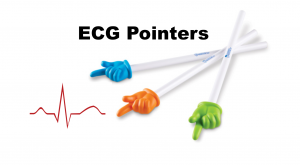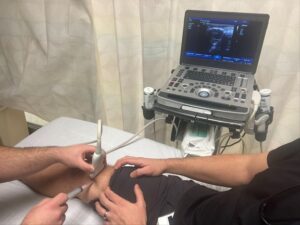Today on the emDOCs cast with Brit Long, MD (@long_brit) and Skyler Lentz, MD (@SkylerLentz), we cover a challenging condition: adrenal insufficiency.
Adrenal Insufficiency
Background:
- The adrenal glands release cortisol, a glucocorticoid.
- Glucocorticoid receptors are present throughout the body, and glucocorticoids affect energy production, electrolyte and volume regulation, vasomotor tone, cardiac activity.
- Deficiency can lead to profound hypoglycemia, hypotension, and general hemodynamic instability.
- The endocrine pathway involving the hypothalamus in response to stress releases corticotropin releasing hormone to the anterior pituitary. The pituitary releases ACTH stimulating the adrenal gland to produce cortisol.
- Adrenal insufficiency can be result of a problem anywhere on this pathway.
- Primary adrenal insufficiency is when the adrenal gland itself fails.
- Secondary or central adrenal insufficiency occurs with failure of the hypothalamic-pituitary axis to stimulate the adrenal gland.
- Adrenal insufficiency can be acute or chronic.
- Acute is often more challenging to diagnose.
Epidemiology:
- Autoimmune adrenal insufficiency in modern countries most often appears between 30-50 years old.
- 60% of cases requiring two or more clinician evaluations before diagnosis.
- Adrenal crisis carries a mortality rate of 6-15%.
Risks and Etiologies:
- Risk Factors
- Primary: autoimmune, infectious, malignancy, genetic, vascular, medications
- Central: pituitary problems, hypothalamic problems, exogenous steroids
- Primary in modern countries is mostly due to auto-antibodies destroying adrenal gland. Other auto-immune diseases or a family history of auto-immune disease is a risk factor.
- Infiltration by tuberculosis is a common worldwide cause. Other causes of primary include adrenal hemorrhage, infiltration by malignancy, surgical removal, and medications affecting cortisol metabolism.
- Common secondary causes include failure of the pituitary to release ACTH by tumors particularly after resection, brain radiation, brain trauma, pituitary gland ischemia.
- Steroid use should be ascertained. The rate of adrenal insufficiency in those on long term inhaled glucocorticoids for asthma is about 5%.
- Variety of triggers (anything requiring a stress response): gastroenteritis (most common), fever and infection, pregnancy, MI, hypoglycemia, surgery or trauma, recent discontinuation of steroids, emotional stress.
Presentation:
- Non-specific signs and symptoms are common and can develop over weeks to months as the adrenal gland slowly fails.
- Fatigue, malaise, and general weakness are the most common symptoms occurring in nearly all cases of adrenal insufficiency; loss of appetite (53-67%), weight loss (66-76%), gastrointestinal symptoms (nausea, vomiting, and abdominal pain in 49-62%).
- The patient may have salt craving, and postural hypotension and syncope are also common symptoms. Fever, delirium may be present.
- Skin hyperpigmentation in primary by ACTH stimulating melanin.
- Key: Consider it in patients with recurrent ED visits for unexplained fatigue, GI symptoms and postural syncope.
Adrenal Crisis Definition:
- Severe signs and symptoms of glucocorticoid and/or mineralocorticoid deficiency with at least two of the following: systolic BP < 100 mm Hg; nausea or vomiting; severe fatigue; hyponatremia (≤ 132 mmol/l), hypoglycemia or hyperkalemia; fever; somnolence or altered mental status; and clinical improvement with parenteral glucocorticoid administration
- Hypotension and/or hypovolemic shock present in most adrenal crisis cases. Shock is often refractory to fluids and vasopressors.
Evaluation:
- Hypoglycemia is often refractory; hyponatremia present in most cases.
- Hyperkalemia and non-anion gap metabolic acidosis occur in primary adrenal insufficiency, but not in secondary Hyperkalemia is not present because aldosterone is regulated by renin and serum potassium not ACTH from the pituitary.
- Hypercalcemia and eosinophilia may be present, but are not reliable for diagnosis.
- Blood cultures, urinalysis, urine culture based on concern for infection.
- Obtain imaging based on patient assessment (i.e., abdominal pain, obtain CT).
- Cosyntropin test:
- Standard test is to administer 250 mcg cosyntropin. A functioning adrenal gland should respond by producing a peak cortisol of > 18-20 μg/dL (500-550 nmol/L) when measured at 30 and 60 minutes after cosyntropin administration.
- A random cortisol > 18-20 mcg/dL suggests against adrenal insufficiency.
- DO NOT withhold therapy in the ED for the cosyntropin test. You can always add on a random cortisol and ACTH to the pretreatment labs. A low cortisol and high ACTH suggest primary adrenal insufficiency.
Management:
- Key components are hydrocortisone, resuscitate, and treat underlying trigger. Patients are toxic and require resuscitation. Antibiotics are necessary, as these patients will look like septic shock, and infection is also a trigger.
- For those in crisis give 100 mg IV of hydrocortisone. This can be followed by 200-300 mg/ day of hydrocortisone such as 50 mg every 6 hours or a continuous infusion.
- Resuscitate with fluids–these patients are often hypovolemic. Normal saline is a good option for the initial fluid because of losses. If hypoglycemic, add dextrose to fluids and replete electrolytes as needed.
- Search for a trigger and treat suspected causes–since it can look like sepsis, antibiotics and cultures are warranted.
Disposition:
- Admit patients with adrenal crisis to ICU.
- Patients with chronic adrenal insufficiency are themselves the experts at treating their illnesses. They may present with a GI illness. Administer fluids, check and correct electrolytes, give an initial IV dose of 100 mg hydrocortisone if vomiting. The patient may have already administered IM/SubQ dosing of steroid.
- If they can tolerate oral fluids and medication, they may be able to go home, with a double or triple dose of their home doses of hydrocortisone while ill and endocrinology follow-up.
- They need to increase home steroid dosing for stressors such as fever, UTI, surgery, or trauma.
- Consult and coordinate with their endocrinologist.
Summary:
- Adrenal insufficiency is a life-threatening emergency and mimic of sepsis; we must recognize early and treat aggressively.
- The hallmark is hypotension refractory to IV fuid/vasopressors and refractory hypoglycemia.
- Suspect in patients with unexplained hypotension and risk factors (prior steroid use, history of autoimmune disease, hyperpigmentation etc.).
- Treat empirically with hydrocortisone 100mg IV and search for and treat precipitating cause; provide IV fluids and glucose.







